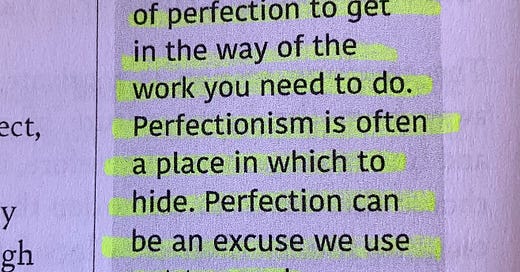Unnecessary anxiety
We are building up expectations and creating false impressions that the finished, polished, and perfect products that we see are the first and only versions to exist. That presentation, written article, heartfelt speech at the all-staff get-together, or executive who exudes gravitas and commands the room is never the first version to exist.
Each is like a draft of a book. The first draft isn't usually fit to be shared; the second and third drafts deliver the fourth draft, which needs thorough reviewing by a copy editor and then a proofreader before publication.
Trust me! As someone who recently published a book, even after getting feedback from a challenge group and passing every sentence through the Grammarly tool to improve my writing, the first pass from the copy editor identified 65 changes—65 changes for a 40-page manuscript! But that is okay. Perfect wasn't the goal.
Everyone receives help
Successful business people, executives, politicians, celebrities, and sports stars all receive help. They weren't even close to perfection when they first started out. Even after considerable time and money are invested in getting help, they achieve excellence only, as perfection isn't real.
I have been writing online and in public for over six years. I can confidently say that every blog, newsletter article, and social media post is imperfect in some way. There is no doubt about it. The formatting, the links, and sometimes the fact-checking, not once, not a single article has been perfect.
What does the pursuit of perfectionism even mean?
Are we doing it to serve the members of our teams or our clients?
Unlikely.
Perfectionism can be a place to hide.
Perfectionism can be an excuse for not sharing our opinions or views on a topic that is important to us.
Being consistent is better than striving for impossible perfection.
Consistency
Consistency has many benefits, and we can use the habit to differentiate and, hence, to our advantage during our careers. When we're consistent, it helps improve the focus and clarity of our communication. By keeping our word to carry out what we've agreed to do, we come across as more committed and acting with integrity. Consistency, therefore, creates accountability.
"Simplicity is the end result of long, hard work. Not the starting point."
Frederick Maitland
Our level of consistency reflects our values and the standards that we expect of ourselves and others.
Do you consistently do what you say you'll do?
If you do, you'll establish credibility and, hence, be credible to your crucial stakeholders—and you will be invited into rooms that were previously closed to you.
📫 - A quote that I am currently pondering
"We don't value things; we value their meaning. What they are is determined by the laws of physics, but what they mean is determined by the laws of psychology.
Rory Sutherland (Alchemy)
🧾 - An absorbing and insightful (short) read
Leadership Excellent: Practical Approaches to Managing Perfectionism
🤔 - If you did have the answer to this question, what would it be?
Is this the best you can do?
⚖ - Before You Step Into The Office
Don't forget to pick up your copy of my new book. In an age where leadership development often comes too late, my new book challenges the norms and assumptions of "follow your passion" and "work harder."




